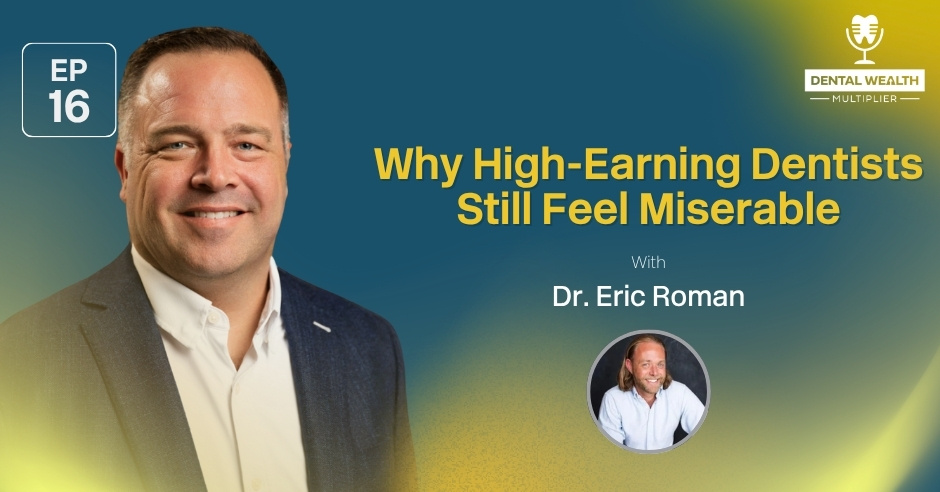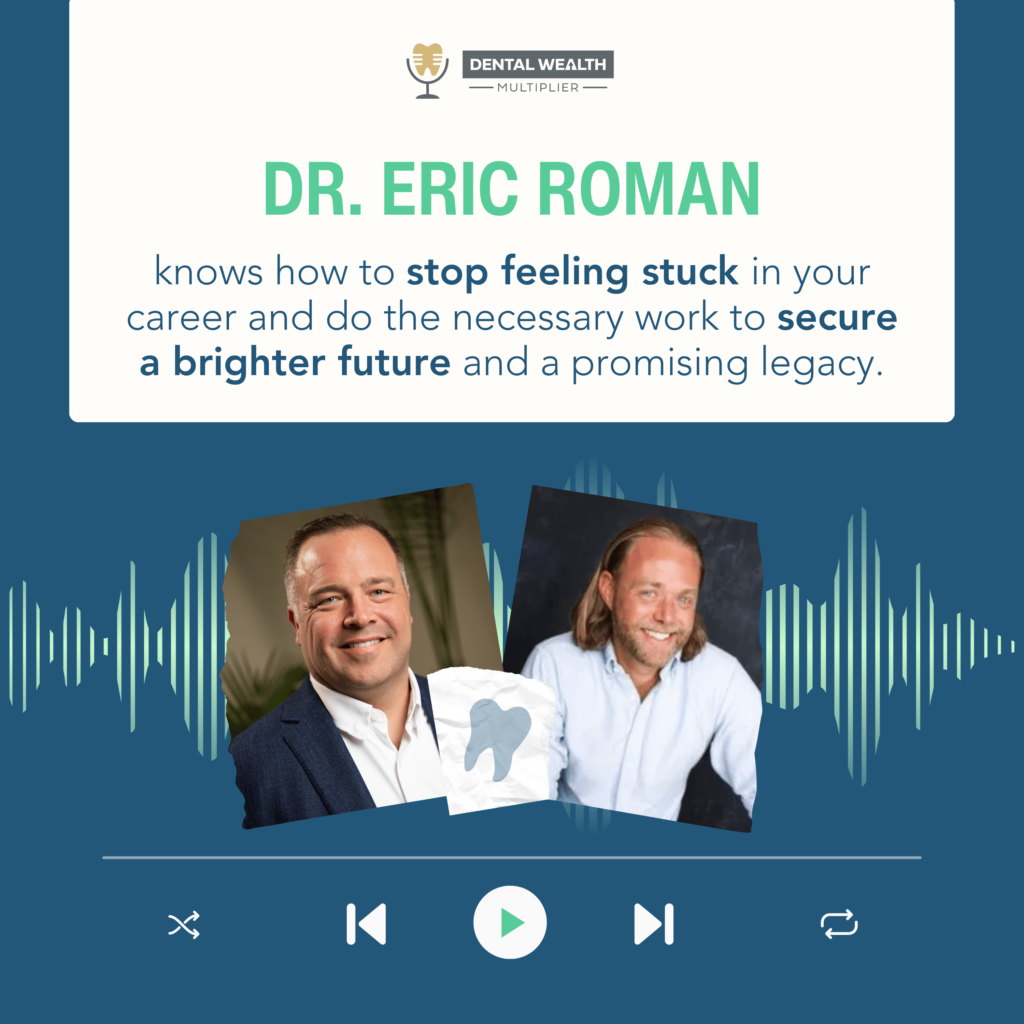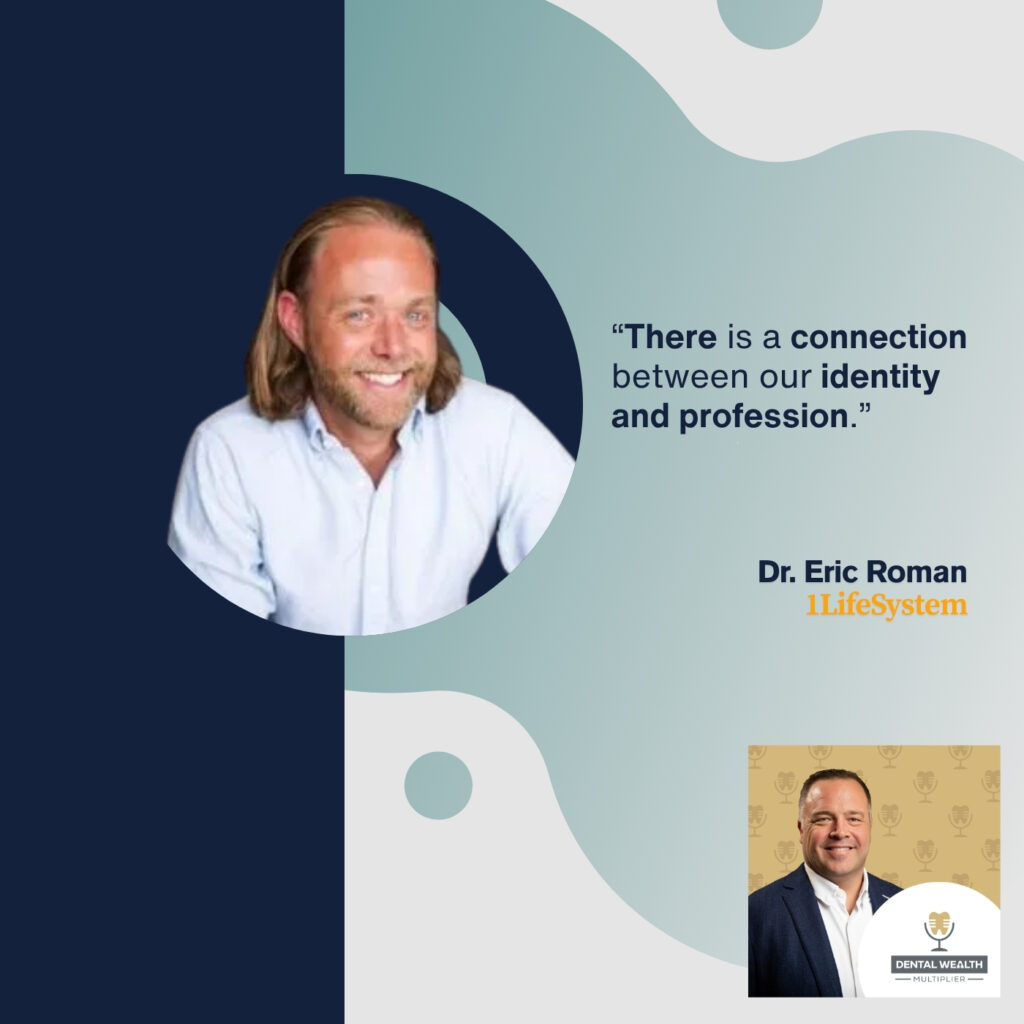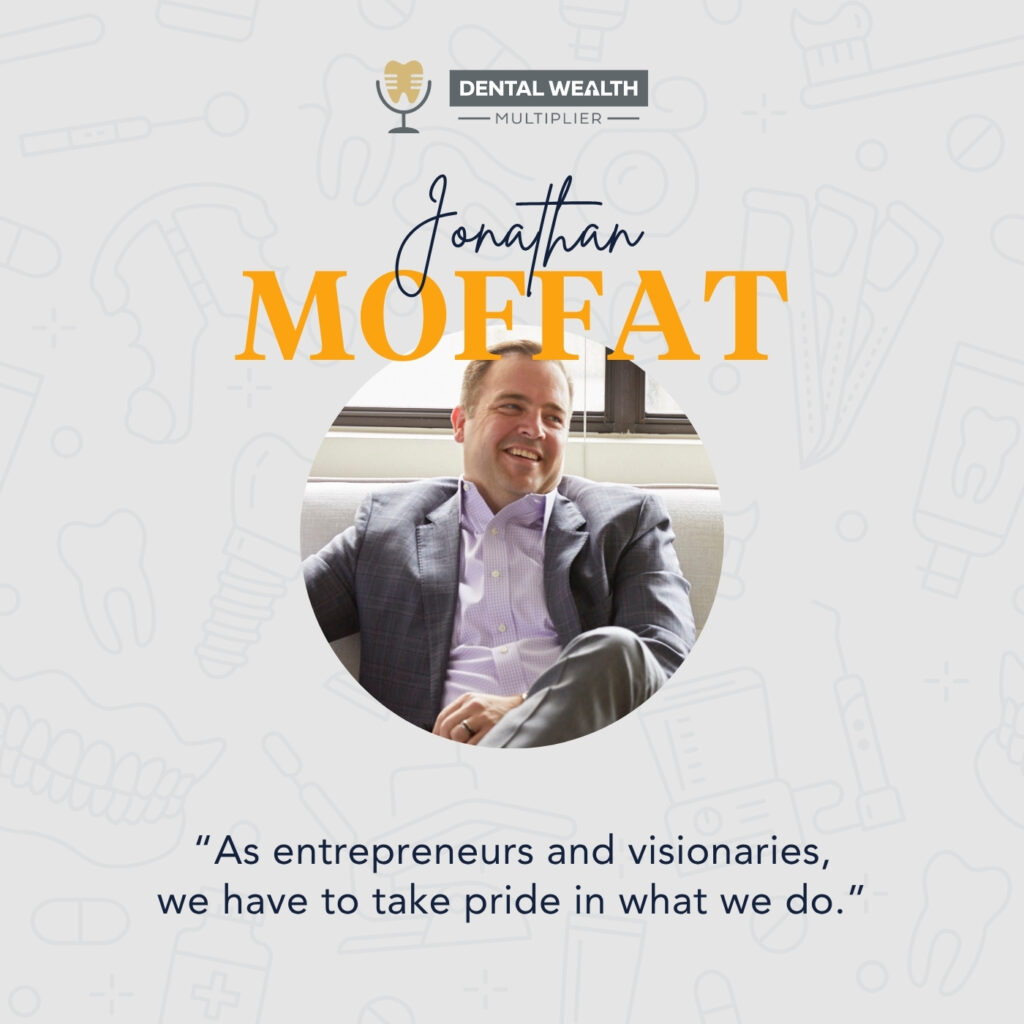
Dr. Eric Roman joins Jonathan Moffat to unpack the uncomfortable truth behind why so many high-earning dentists feel stuck in a business they thought would set them free. From the identity crisis that comes with stepping back to the perfectionism that sabotages delegation, they dive deep into what really keeps high-achieving practice owners from feeling fulfilled. Learn how to break from the unhealthy relationship with your career and find fulfillment in your daily tasks. If you have ever caught yourself saying, “I love what I do… but I can’t keep doing it like this,” this conversation is for you.
Find Jonathan at jonathanmoffat.com
Learn more about Aligned Advisors at alignedadvisors.com
Connect with Dr. Eric Roman at drericjroman.com
Find Jonathan on LinkedIn: linkedin.com/in/jonathanmoffat1
Find Dr. Eric on LinkedIn: linkedin.com/in/drericjroman
This show is about more than just growing a practice, it’s about building a life that actually works for you. Follow along at dentalwealthmultiplier.com
—
Watch the Episode here
Listen to the Podcast here
Why High-Earning Dentists Still Feel Miserable With Dr. Eric Roman
Transitioning From Operator To Investor
I have ended up in a lot of conversations lately about people who have built successful practices or groups, and the concept of “I want to get out.” You and I have talked about this a bit before. It’s like, “I want to exit. I don’t know if I totally want to exit. I think I want to exit. I definitely want to exit.” There are all these emotions, thought processes, and almost like the psyche. I’m bringing it up, Jonathan, because I think I’ve discovered something. I know it was this way for me.
What we all want is we want to move out of being an operator and into being an investor. That’s pure Kiyosaki. The operator, though, is getting all the phone calls, doing the hiring and firing, and paying the price of every lost team member, lost doctor, or whatever else. They’re still under fire in the operator role. We love the business in some ways. We’d be content to enjoy the cashflow. We want to move into the investor quadrant, but the problem is, and this is what I’m discovering, something about us as a people in the industry of dentistry.
I have friends in mastermind groups and other industries who have no trouble moving from operator to investor. That’s a simple transition, but something about dentist-built companies, we struggle to make that transition. What I’m putting my finger on is that the reason a lot of us do some transaction, whether it be full, partial, or whatever, is simply to force the change in the relationship between us and the business.
We didn’t want to break up with it, but we had to do a deal to make the relationship different or get to the investor box. I look back on my journey, and that is the exact thing I wanted. I wanted to be the investor, and I tried for years. I had to do a transaction to change my relationship with the business. How much have you seen this?
I want to be careful because I’m not a dentist.

Are you going to say anti-dentite things? I can say those.
I’m not going to say anti-dentite things, a great Seinfeld pull. I’m going to go here, and then I’m going to come back. I don’t think it’s just the dentist issue.
That makes me feel better.
As visionaries, as entrepreneurs, and as business owners, we all have a certain way that we want things done. It’s one of the reasons why a lot of entrepreneurs have a hard time delegating and why a lot of entrepreneurs are do-it-yourselfers. To some extent, you go, “Jonathan, that’s not true. I’ve got a front receptionist.” Some of that is natural. You didn’t go to dental school, so you could answer the phone every day. You can pay someone $18 or $20 an hour to do that.
In order to move from operator to investor, which I love, delegation has to go a step further. You hear me talk a lot about how the best passive income vehicle is your practice, but you’re not running it that way. You’re running it as an active investment. I’m going to pull it back around. I had dinner with a client of mine and his associate. We were getting tacos. It was Taco Tuesday.
We’re sitting there with him and his associate. The topic we’re talking about is AI, CEREC, 3D printing, and how quickly technology is catching up and how it’s going to change the industry. We’re having this conversation, and he makes this comment. I said, “As a patient, because I value my time, I would pay an extra $100, $150, or whatever it was to sit there for 20 minutes while my crown was 3D printed so I didn’t have to come back and have my temporary crown taken off.”
We do not have to break up the relationship with our business. But we have to make it a little different to get to the investor side. Share on XHe said something to the effect of, “Most dentists are okay with that because it’s less quality work. It’s not up to my standard.” There’s a connection there where he was like, “It’s not up to my standard.” That’s an interesting topic, and one where I’m not going to go too far because I want your input on that as a dentist. As business owners and entrepreneurs, we all have a certain level that we want our team to perform. If we’re going to put our name on it, it has to be at a certain level.
I also think that a lot of us are perfectionists, almost to a fault. My wife will make fun of me. I’ll be working on a project. It’s good and it’s fine, but then I see that one little piece that’s out of place. I got to go mess with that one little piece that is out of place, and then what happens? It jacks up the entire thing. I’m like, “If I had just left it alone, no one would’ve known.”
Connection Between Identity And Profession
You’re hitting the nail on the head. We can’t let go. Do you know what that is? There is a connection between our identity and our profession. In other words, that piece of perfection mindset has been imbued in what we’re doing every day. We’re like, “That’s who I am.” In other words, I can’t change my relationship with the business because the business and I, as the operator, are how I know myself.
I can’t break up with it unless somebody breaks me up with it. It’s almost like, “I can’t break up with you, but I need you to break up with me.” Do you know what that is? It’s an unhealthy relationship. That’s exactly what you established. What I heard you say is that this is a sign that we have an unhealthy relationship with ourselves. It is more common with dentists than it is with other people because we have to own the crap out of what we do.
You’re saying that instead of me going to therapy and figuring out how to have a healthy relationship, I’m just going to get divorced or break up with a sale to move on. The reality is that for most of us, what happens once that sale is done, we’re like, “I’m going to go start another practice.”

It’s because we want to be in an unhealthy relationship again. I will say this. I’m there right now.
Where is there?
I’m getting back into owning again. It’s something that I thought I would never do again because of what you and I have talked about. This is the greatest investment. I have access to it. I’m a skilled wizard in this space.
You’re good at it.
I should be freaking doing this. What’s interesting is that because I’ve broken up with it and I did the identity work because I learned how to have a healthy relationship, I’m not stepping into that. I couldn’t even go back into that unhealthy relationship again. I’m approaching it that way. When I’m looking for high-profit practices that are a great fit for me and not for the rest of the world, I can be clear about, “This is who I am. This is who I’m not. This is the line in the sand. This is the benefit. This is what you might not like about me.” I had to do a lot of personal work. I had to sever my relationship. I had to break up with the profession. I left dentistry three times, but it keeps calling me back like a tapeworm. It’s interesting.
As you’re saying that, I was thinking of the very first version of associate that I had in my business. I was sitting here and laughing. I’m sure I was so ridiculous. Bless him for having the patience with me that he did. It’s one of those things where I was like, “Go ahead and send out this email,” and then he would type up the email and say, “Look at it.” I would change three-quarters of the email. The reality is that what he created was probably fine, but it wasn’t how I would’ve said it.
Most problem lies not in the business itself, but your relationship with it. Share on XI was talking to someone. We were talking about the practices that I owned. I said, “I don’t know whether it is or isn’t. I choose to see it as an advantage, and this is why.” I had a slight advantage. I’m not a dentist. When we had a doctor call out sick or we were going to need to hire, the option was never, “Get Jonathan in here to do that.” If we had a doctor do a crown, I don’t have the training, the clinical background, or the licenses to sit there and go, “That crown doesn’t look right. You need to change it. It’s off a little bit.” I didn’t have that.
As entrepreneurs and as visionaries, we’re not saying don’t take pride in what you do. You should have pride in what you do. At the end of the day, your Eric J. Roman name is stamped on that. You’re not saying, “Let’s go create a lesser product.” How do you learn to let go? How do you learn to make that transition? Do you need someone to come in and say, “Don’t worry about what that crown looks like. It’s fine. It’ll be okay. Let’s just move on.” How do you learn to do that yourself so that you’re not spending that immense amount of time and resources, stressing about all these things that maybe, in the long run, aren’t that important, but are keeping you from progressing to an investor?
The answer is yes. At the end of the day, is it possible? It requires a lot of work. With one of my dear friends, who gave me the blessing of coaching her, that was the exact topic. I said, “The issue here isn’t the thing that we think it is. This is about your relationship with the business.” I told her. I was straight up. I said, “This might mean therapy. This might mean getting your therapist and figuring out why you can’t break this identity connection to the business.”
We think that the strategy is a letter of intent, this, that, and the other. That’s not the strategy. The strategy is to deal with the crap. The strategy is dealing with the internal relationship that has to be broken within the business, the unhealthy internal relationship, the broken relationship, or whatever is at the root of it. That’s the strategy.
I do think it’s possible. I don’t think it will be common. I could talk about it all I want, and prayerfully, it helps one person. It’s an interesting reframe. No wonder DSOs are succeeding and convincing us to do transactions. It’s because they’re preying upon the fact that our identity is connected to the business, and we have to figure out how to break that. Maybe that’s what DSOs are. They’re just a form of expensive therapy.
Stop running away from your problems. Do a little bit of work and your future will be a lot healthier than your past. Share on XIt doesn’t come with some mistakes. Mistakes are going to happen. I’ll share a real story. While we were scaling and growing, I brought on a couple of team members, and I was working my way out of the operator role, something happened with a long-term client of ours. It wasn’t even our fault. It was a team member outside of our firm. At the end of the day, the buck stops with me. It’s my client. It’s my business. I have to take ownership.
I remember having this conversation. It was a tough conversation. They’re still clients of ours, but I was like, “We might lose this client over this.” It was an opportunity to take some self-reflection and be like, “It’s not how I would’ve done it. It shouldn’t have happened this way, but we’re going to use this as an opportunity to learn and create some training.” Maybe there was a gap in our SOPs that we needed to address.
You have to first make this distinction. You’ve heard me say this before. I was speaking, and I asked this question. I said, “Of all the 60 doctors in the room, burnout and stress are real. It’s the number one reason why doctors are exiting dentistry. They’re completely burned out. If you could design your day, your week, or your month to come in and work on the times, the hours, and the days you wanted to and do the things you wanted to do that you gave you the most reward and where you got the most value out of, how much longer could you practice dentistry?”
Every hand goes up and goes, “I could do that forever. I could do that for the next fifteen years.” I was like, “Time out. Three minutes ago, you said you were ready to go. In fact, you’re at this conference looking for someone to buy your practice. Now, you’re saying you could do it forever?” This is one of those things where it dawned on me in the moment.
Potential Solutions From Today’s Technology
I was like, “If you’re an administrator or an operator supporting the doctor and you want to keep your doctor around longer, what do you think you should do?” They were like, “I don’t know. Maybe figure out how to help them work the time that they want to work and the days they want to work, doing the procedures that they want to do, and take the rest of the stuff off of their plate.” We’re fortunate to live in a time when technology is catching up to that. Technology is going to start solving some of those issues.
Going back to my example of what my client said about whether some doctors are okay with that quality of work, meaning, that’s a lesser quality in what I’m used to giving my patients, guess what? In the next two years, it’s probably not going to be an issue. You’re going to have an AI program design the CAD file for the tooth, which is going to be cosmetically exactly how it should be.

You’re going to have a 3D printer print the thing. You’re going to have it stain it, glaze it, and all the other stuff, and it’s ready to go. It’s going to be an actual perfect rendition of that, which is going to fit better than it probably ever has before because AI is going to know. You know all the technical terms, not me. Even that piece is going to be solved. The last thing I’ll say is I was speaking. We were talking about SOPs. They were like, “Can you help me create our SOPs? Who can help me create my SOP?” The cool thing about how quickly technology is advancing is that people are running out of excuses.
I freaking love it.
Eventually, the only excuse is going to be, “I don’t want to do it.” It already is the only excuse, honestly, because I can go into ChatGPT. I’ve done this live, presenting before. I can create a step-by-step procedure for how to sterilize. Maybe it’s not 100%, but it’s 95%.
Episode Wrap-Up And Closing Words
I love it. We nailed this. I’m going to summarize. We have discovered a thing, maybe not the first to discover it. The reality is that our relationship with dentistry is unhealthy. If we approach this like an unhealthy relationship, and instead of trying to break up with it to solve the unhealthy relationship, we did some therapy to solve it, we could have a lot more of what we want without the things we don’t.
There’s a real benefit to that. There’s value there. It’s healthy. Maybe our encouragement is to stop running away from the problem and do a little bit of the work. Your future is going to be a lot healthier than your past was. You can maintain the legacy and the beauty of what you have without the obligation to tap out. I think that’s a good summary.
Important Links
- Dr. Eric Roman
- Dr. Eric Roman on LinkedIn
- Dr. Eric Roman on Instagram
- Jonathan Moffat
- Jonathan Moffat on LinkedIn
About Dr. Eric Roman
 Dr. Eric J. Roman started his professional journey as a dentist, but soon became the CEO of fast growing, multi-location dental groups that generated over $200m in care during his leadership. Eric strategically led his DSO through an exit in 2019, and chose to step out of DSO leadership to pursue a more balanced life.
Dr. Eric J. Roman started his professional journey as a dentist, but soon became the CEO of fast growing, multi-location dental groups that generated over $200m in care during his leadership. Eric strategically led his DSO through an exit in 2019, and chose to step out of DSO leadership to pursue a more balanced life.
His next growth phase came in the form of executive coaching and thought leadership, both inside and outside the dental industry. As one of the dental industry’s most esteemed experts on team dynamics, emerging DSO operations and associate dentist development, Eric spent several years coaching a community of more than $3B in annual revenue via the Dentist Entrepreneur Organization.
After his tenure at the DEO, Eric shifted his energy toward addressing an alarming trend: data is showing that, despite the success of our businesses, entrepreneurs and their teams are continually less fulfilled in their personal lives. To solve this, Eric developed the 1LifeSystem, a simple, recurring digital retreat that delivers personal fulfillment without sacrificing professional success. Whether it’s as a founder, operator, advisor, or investor, Eric loves to put his energy toward moving our industry forward.
